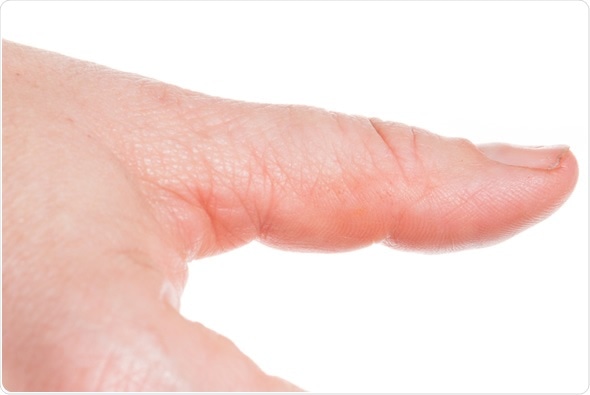The gastrointestinal region of the body includes organs such as the liver, pancreas, and gall bladder, pharynx, esophagus, stomach, small intestine, large intestine, and rectum. There are several diseases that affect the gastrointestinal region that, in turn, also affect the appearance and natural function of the skin.
Inflammatory bowel disease (IBD) is one particular ailment that can negatively affect skin health. IBD is comprised of two conditions: ulcerative colitis and Crohn’s disease. IBD has a number of causative factors which lead to some immune pathways being more active. This condition can often trigger a range of skin conditions for certain patients.
Here are some skin conditions that are the result of issues in the gastrointestinal region:
Koilonychia
Koilonychia is characterized by spoon-shaped nails. The disease is sometimes caused by an iron-deficiency due to stomach ulcers, stomach cancer, or bowel cancer. An excess of iron caused by liver disease or long-term dialysis can also trigger the disease. The autoimmune disease lupus erythematosus, which can attack various cells, organs, and tissues in the body, can also lead to koilonychia. This condition can be managed by treating the underlying condition that is affecting the nails (i.e., iron replacement therapy if associated with iron deficiency).

Koilonychia is characterized by spoon-shaped nails. Image Copyright: bmf-foto.de / Shutterstock
Palmoplantar keratoderma
Palmoplantar keratoderma is a condition that causes thickening of the skin on the palms and/or soles of the feet. Adenocarcinoma, which affects the glandular cells in the stomach, and other GI tract tumors can be source of this symptom. The skin can be treated with emollients, vitamin D ointments, keratolytics, and retinoids.
Panniculitis
Panniculitis is an aggravation of the fatty layer underneath the skin which occurs due to Crohn’s disease (inflammation of the digestive system) or ulcerative colitis (inflammation of the colon and rectum). Some medications have also been linked to panniculitis. This condition is most commonly found in women. Treatment of the underlying condition, if known, is the best method for managing this disorder.
Pyostomatitis vegetans
This is a skin condition which most commonly affects males. It forms many grey to yellow pustules in the folds of the mouth and lining of the lips. A common symptom is burning pain around these areas. Pyostomatitis vegetans can be a symptom of Crohn’s disease and ulcerative colitis.
Henoch-Schönlein purpura
Henoch-Schönlein purpura is a rash caused by the inflammation and hemorrhaging of blood vessels. It can develop after an infection in the throat. The rash does not disappear after it is pressed; however, it can resolve itself without treatment within a period of a few days.
Erythema nodosum
Erythema nodosum is a condition that forms painful lesions of bluish-red nodules which can resemble bruising on the skin in the shin area. These bruise-like lesions can also be found on the arms, ankles, knees, and torso. It most commonly affects women and is caused by Crohn’s disease and ulcerative colitis. Erythema nodosum can be treated with medicines such as oral steroids, immunosuppressants, nonsteroidal anti-inflammatory drugs (NSAIDs).
Pyoderma gangrenosum
This skin symptom can be the result of ulcerative colitis or Crohn’s disease. It forms painful ulcers on the patient and is more common in women than men. Ulcers can develop as single entities or several at a time and they usually form on the legs; however, ulcers can also arise anywhere on the body. Pyoderma gangrenosum can be diagnosed with a skin biopsy. Treatment can be quite challenging for the patient and require a combination of wound care, medications, antibiotics, and steroids.
Pyodermatitis vegetans
This is the clinical, rare form of pyoderma gangrenosum. Lesions of pustules form in the folds of the patient’s skin and rupture.
Neutrophilic dermatoses
This skin condition presents as tender, reddish-purple inflammatory nodules on the face, neck, and arms. It mainly affects women between the ages of 30 and 50 who have colonic disease as a result of illnesses such as Sweet’s syndrome and bowel-associated dermatosis-arthritis syndrome. Neutrophilic dermatoses is usually treated with steroids.
References
Further Reading
Last Updated: Feb 26, 2019